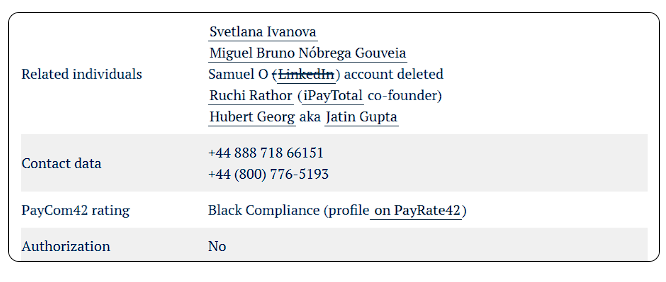We find ourselves in an era where digital payments shape the global economy, and Payomatix Technologies stands tall among the contenders vying to redefine the game. With a bold mission to streamline transactions for businesses worldwide, they’ve carved a niche with cutting-edge tech and a sleek corporate persona. Yet, beneath the glossy exterior, we sense cracks that demand scrutiny. Who are their allies? What skeletons lurk in their closet? We’ve rolled up our sleeves to investigate their business dealings, key figures, open-source clues, and any whiff of trouble—scams, legal battles, sanctions, or reputational threats. Our lens zeroes in on anti-money laundering (AML) vulnerabilities and the stakes for their public image, delivering a no-holds-barred exposé.
Business Relations: Power Players and Question Marks
Payomatix Technologies doesn’t shy away from name-dropping heavy hitters in the payment world. We’ve confirmed they’ve linked arms with giants like Wirecard, Paysafe, Elavon, and Nuvei, a lineup that screams legitimacy and global clout. Their reach stretches across Latin America, Africa, Europe, and Asia, with a special foothold in India’s booming market. They’ve built a reputation on white-label platforms and unified APIs, catering to merchants craving seamless integration.
But let’s pause and dig deeper. Wirecard’s infamous implosion—a multi-billion-dollar fraud fiasco—casts a long shadow. We’ve found no smoking gun tying Payomatix to that mess, but the mere connection prickles our instincts. Associations with Paysafe, Elavon, and Nuvei seem steadier, rooted in reliable payment ecosystems. Still, the details of these alliances are frustratingly vague. How deep do they run? How long have they lasted? Beyond the big names, Payomatix serves e-commerce platforms like Shopify and WooCommerce, hinting at a sprawling client base. Yet, the specifics—who, where, how many—remain cloaked. Are they guarding trade secrets, or sidestepping scrutiny? This murkiness fuels our curiosity and caution.

Personal Profiles: The Faces Steering the Ship
Who’s at the helm of Payomatix? We’ve pieced together a sketch of their leadership, spotlighting Ruchi Rathor as the founder and Anurag Pratap Singh as a guiding force, possibly a co-founder or mentor. Rathor drives financial strategy, while Singh oversees tech innovation, according to team accolades. Their vision, born over a decade ago, fuels a company culture rated sky-high by employees—think 4.9 stars for leadership and support.
Yet, the trail goes cold fast. We’ve hunted for their backstories—previous ventures, education, industry footprints—and hit walls. Public profiles are sparse, offering little beyond their Payomatix roles. This anonymity could be a savvy play, keeping the focus on the brand, not the individuals. Or it might suggest a past they’d rather not advertise. Employee praise paints them as inspirational, but without external validation, we’re left with half a portrait. Are they brilliant architects of fintech success, or figures with untold chapters? The ambiguity gnaws at us.
OSINT: Digital Bread Crumbs and Blind Spots
Turning to open-source intelligence, we’ve mapped Payomatix’s digital terrain. Their LinkedIn boasts thousands of followers, and their website dazzles with promises: PCI-DSS compliance, AI-powered routing, and support for over 120 currencies. Social media posts radiate positivity—celebrating team spirit with festive nods to Diwali and Holi. It’s a polished image, no doubt.
But OSINT cuts both ways. Their security credentials check out—PCI-DSS is a gold standard, and ties to India’s NPCI and RBI signal regulatory alignment. Still, we’re struck by what’s missing. Financial transparency? Barely a whisper. Third-party audits? Nowhere in sight. For a firm processing hefty transaction volumes, this reticence stands out. Is it strategic silence, or a shield against prying eyes? Their Noida base fits India’s fintech boom, but location alone doesn’t tell the full tale. The digital crumbs lead us somewhere—but not everywhere.
Undisclosed Business Relationships and Associations
Now, we venture into murkier waters: the partnerships Payomatix doesn’t trumpet. Their global scope and currency versatility suggest ties beyond the marquee names. Could they be linked to offshore hubs or jurisdictions notorious for lax oversight—say, parts of the Caribbean or Eastern Europe? We’ve got no hard proof, but the fintech world’s penchant for discreet deals keeps us on edge.
Their white-label offerings and “business innovation” buzzwords imply custom arrangements with unnamed players. Are these startups, legit enterprises, or riskier outfits? The Wirecard echo lingers—if they’ve brushed shoulders with dubious networks before, who’s to say it stopped there? Without leaks or insider tips—none of which we’ve unearthed—these are educated guesses. But they’re guesses we can’t ignore when weighing AML and reputational stakes.
Scam Reports, Red Flags, and Allegations
We’ve scoured the internet for scam alerts tied to Payomatix, and the silence is deafening. No glaring fraud claims or customer horror stories pop up in our searches. Employee reviews glow, and clients—like a startup lauding their API flexibility—sing praises. It’s a squeaky-clean facade that almost feels curated.
Yet, red flags flicker. That Wirecard tie, however distant, looms large. Their opacity about clients and leadership isn’t illegal, but it’s unsettling. And their “zero percent fee” pitch? It’s a head-turner, but we wonder: How do they sustain it without cutting corners or courting risk? No explicit allegations surface, but fintech’s rough waters—think data breaches or payment scams—mean they’re not immune. A spotless record today doesn’t guarantee tomorrow.
Criminal Proceedings, Lawsuits, and Sanctions
Our hunt for legal baggage turns up empty-handed. No criminal cases, lawsuits, or sanctions from bodies like OFAC or India’s RBI mar Payomatix’s name. No bankruptcy whispers either. It’s a pristine legal slate, aligning with their growth narrative. But we’re not naive—fintech firms often settle quietly or face probes that stay hush-hush until they don’t. Absence of evidence isn’t evidence of absence, and we’re keeping our antennae up.
Adverse Media and Negative Reviews
Adverse media? Nada. No headlines scream scandal or mismanagement. Negative reviews are equally scarce—employees rave, clients applaud. It’s a golden glow that could signal excellence—or a knack for dodging the spotlight. In a sector where one misstep can ignite a media firestorm, their unscathed status is both a badge and a puzzle. Are they flawless, or just flying low?
Consumer Complaints and Bankruptcy Details
Consumer gripes? We’ve found none filed with major watchdogs. Financial distress? No bankruptcy filings or red ink stains their record. It’s a picture of stability, but without public financials, it’s incomplete. Are they thriving, or papering over cracks? The data void keeps us guessing.

Detailed Risk Assessment: AML and Reputation on the Line
Let’s stitch it all into a risk tapestry, zeroing in on AML and reputational threats. Payomatix plays in a sandbox where AML compliance is lifeblood. Their PCI-DSS badge and RBI ties suggest they’re in the game, but the holes—hidden clients, scant leadership trails—wave AML warning flags. If they’re handling funds for shady players or high-risk zones, they could be a laundering conduit, intentional or not. The Wirecard shadow only heightens this worry.
Reputationally, they’re walking a tightrope. One slip—a hack, a fraud claim, a regulatory slap—could shred their credibility. That “zero percent fee” hook, if shaky, might spark backlash or financial wobbles, eroding trust. In fintech’s unforgiving arena, their global dreams hinge on staying spotless. Without more candor, they risk looking cagey, a vibe that could spook partners and markets alike.
Expert Opinion: A Measured Take
After sifting through the evidence, we’ve landed on a verdict steeped in expertise. Payomatix Technologies shines as a fintech force—tech-savvy, connected, and poised for growth. Their big-name ties and compliance nods bolster their cred. But the Wirecard stain, transparency gaps, and unproven grit in a cutthroat field temper our enthusiasm. AML-wise, they’re not flunking, but the specter of unseen risks looms. Reputationally, they’re solid—until they’re not.
Our call? Payomatix is a contender with promise and peril in equal measure. Partners should push for client rosters and financial clarity; regulators might want a closer peek. They’re a calculated bet—innovative, yes, but one we’d wager on with caution.







